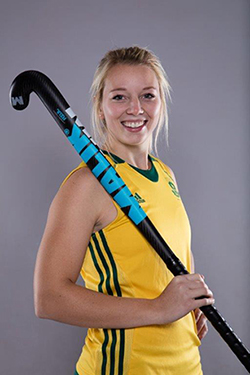Latest News Archive
Please select Category, Year, and then Month to display items
02 January 2025
|
Story Gerda-Marie van Rooyen
|
Photo Supplied
 Leading the research in South Africa is Prof Linus Franke from the Department of Soil, Crop and Climate Sciences.
Leading the research in South Africa is Prof Linus Franke from the Department of Soil, Crop and Climate Sciences.
Scientists are actively pursuing the successful breeding of diploid hybrid potatoes from inbred lines. This is expected to revolutionise potato breeding as it holds the key to rapid genetic progress. It will introduce new varieties for commercialisation through seed. Currently, existing potato variants have a gene that renders self-pollinated seeds infertile.
Prof Linus Franke, an academic in the Department of Soil, Crop and Climate Sciences at the UFS, is leading the research in South Africa. “This technology allows the production of genetically uniform potato seed that is easy to transport and largely disease-free.” He says this differs from conventional breeding whereby only vegetative propagation is possible due to tetraploid varieties in potatoes. It also risks carrying pests and diseases from one generation to the next – leading to the accumulation of pests and diseases with each round of multiplication.
Seed innovation
Prof Franke explains that Solynta BV, a seed company based in the Netherlands that produces potato varieties that can be grown from seed, has included South Africa in their research efforts because it is one of Africa’s largest producers and exporters. Through his academic relationship with Wageningen University and Research, a Dutch institution renowned for its agricultural endeavours and food production, the UFS became involved in researching hybrid potatoes grown from seed.
Diploid seeds containing two sets of chromosomes allow easier gene manipulation to increase predictability and speedier genetic progress. The breeding approach enables the incorporation of tolerance to pests, diseases, abiotic stresses (cold, heat, drought) and other desired genetic traits.
Although Prof Franke is optimistic about this research, he is not blind to disadvantages. “Potato seeds are tiny and have little energy reserves, making it harder to grow potatoes from seed than from tubers.” He says potatoes from seed will take longer to cultivate than tubers, as farmers need to grow plantlets from seeds first, adding six weeks to the growing period. “It is possible that commercial farmers can grow potatoes directly from seed. Alternatively, perhaps more likely, specialised growers will produce tubers of potatoes from seed; these tubers are then sold as seed tubers to other potato farmers, who then continue their normal practices of producing potatoes for the market from tubers.”
Financial benefits
Prof Franke says farmers have reason to get excited. “Seed potatoes will reduce input costs, as varieties with enhanced tolerance to pests and diseases require less pesticides. Planting one hectare of potatoes requires three to four tonnes of potato tubers, but only one 25 g packet of potato seeds.” Since potatoes are a more valuable commodity than maize, this technology might also increase farmers’ income potential.
National U21 Hockey Player of the Year is a Kovsie
2015-09-16

The best U21 hockey player in the country
for 2015, Nicole Walraven |
Nicole Walraven, a student at the University of the Free State (UFS), had a pleasant surprise waiting for her on 29 August 2015. She had participated at the Women's Interprovincial Tournament in Potchefstroom, and watching the finals from the stands with her family when the announcement was made.
“They announced that they were going to award South Africa’s (SA) Under-21 player of the year. It did not even go through my head that I could stand a chance of winning it. Then next minute, I hear my name being called. ”
“To win such an amazing award means so much to me. To be acknowledged as SA Under-21 player of the year of the entire country is still something that hasn't sunk in yet; I still can't believe it,” remarked Nicole.
Prior to this tournament, the 20-year-old was selected by the South African Hockey Association to represent South Africa, at senior level, at the World League in Spain and has again made the senior squad for selection to play in the Africa Cup of Nations tournament in October.
Nicole, a descendant of hockey players, is ambitious about winning the Africa Cup, which would open doors to the Rio Olympics. “It is my biggest dream to go to the Olympics. If I had the chance to go, I would be the 4th generation Olympian in my family,” she said.
In addition to her family, the final-year BA Human Movement Sciences student, credits her lecturers for her ability to juggle academics and a thriving sports career successfully.
“I owe it to my lecturers and the University for making it possible for me to pursue my dream as well as my studies,” she said, “It hasn't been easy, and I've had to make a lot of sacrifices but it's most definitely worth it.”
Also representing Kovsies on the SA Women’s Hockey team are Liné Malan and Tanya Britz.